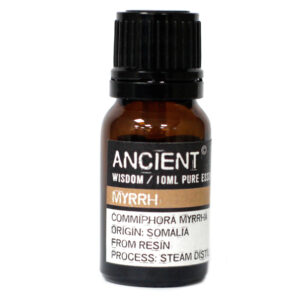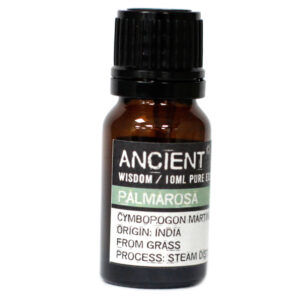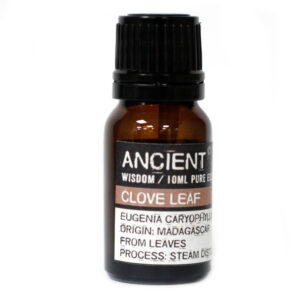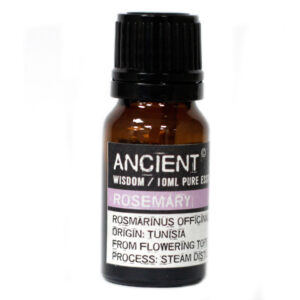
Description
The World of Aromatherapy’s Patchouli Essential Oil
🌱 Immerse yourself in the earthy allure of Patchouli Essential Oil, a timeless scent capturing the spirit of nature’s serenity.
🍂 Known for its grounding properties, this deeply aromatic oil whisks you away on a journey of mindfulness and balance.
💆 Elevate your wellness rituals as Patchouli provides a soothing embrace, promoting inner calm and emotional release.
🌟 Perfect for meditation or moments of reflection, its warm, musky tones anchor the senses and nurture the spirit.
💚 With every drop, The World of Aromatherapy’s Patchouli Essential Oil promises a sacred sensory experience like no other.
Latin Name: Pogostemon Cablin
Part of Plant Used: Dried Leaves
Source: Indonesia
Extraction Method: Steam Distillation
Patchouli Oil is extracted from the Pogostemon cablin plant of the mint family and has a rich musky-sweet, spicy smell. The plant is native to Malaysia and India, where it is known as ‘puchaput’. The word patchouli is derived from Tamil ‘pachchai ilai’ meaning, simply, ‘green leaf.’ Patchouli oil is extracted from the young leaves, which are dried and fermented before steam distillation. This oil improves its fragrance and power with age. It is much valued in skin care, especially in scar healing.
In eastern countries, patchouli oil is used in potpourris and sachets between linen and clothes for the fragrance as well as to keep bedbugs and insects away. The oil is said to have a balancing effect on the emotions and create an amorous atmosphere. When used in an oil burner, it eases anxiety and depression. Used in bath water, it is believed to help skin and scalp complaints, fungal infections, fluid retention, break down cellulite and ease constipation. It has excellent tissue regenerating properties, speeds up healing and fights infections. Thus, it helps acne, eczema, weeping sores, ulcers, and athlete’s foot.
It seems that patchouli was placed between Indian cashmere shawls before being sent to Victorian England, to protect the merchandise from moths. Without this signature smell of dried patchouli leaves, the shawls could not be sold in England. In Europe and America, patchouli oil and incense was immensely popular in the 1960s and 70s among the hippies, since the smell of patchouli covered body odour and the smell of burnt cannabis. Patchouli was used as a hair conditioner for dreadlocks. In many Asian countries, patchouli is also used as an antidote to snakebite.
Additional information
| Weight | 0.04 kg |
|---|---|
| Size | 10ml, 50ml, 500ml |
You must be logged in to post a review.
Related Products
Related products
-

Myrrh Essential Oil
£22.95 – £675.00Price range: £22.95 through £675.00 Select options This product has multiple variants. The options may be chosen on the product page -

Palmarosa Essential Oil
£4.25 – £79.95Price range: £4.25 through £79.95 Select options This product has multiple variants. The options may be chosen on the product page -

Clove Leaf Essential Oil
£3.55 – £69.99Price range: £3.55 through £69.99 Select options This product has multiple variants. The options may be chosen on the product page -

Rosemary Essential Oil
£4.00 – £75.00Price range: £4.00 through £75.00 Select options This product has multiple variants. The options may be chosen on the product page
Patchouli Essential Oil: Benefits and Uses in Aromatherapy
Patchouli essential oil is a popular essential oil used in aromatherapy. It is derived from the leaves of the patchouli plant, a type of aromatic herb. Patchouli essential oil has a distinct earthy, musky, and grounding aroma that is known to have a calming effect on the mind and body.
Patchouli essential oil has been used for centuries in traditional medicine and aromatherapy practices. It is known for its therapeutic properties, which include antifungal, antiseptic, and anti-inflammatory effects. Patchouli essential oil is also used for its relaxing and mood-enhancing properties, making it a popular choice for aromatherapy and meditation.
Key Takeaways
- Patchouli essential oil is derived from the leaves of the patchouli plant and has a distinct earthy aroma that has a calming effect on the mind and body.
- Patchouli essential oil has therapeutic properties, including antifungal, antiseptic, and anti-inflammatory effects.
- Patchouli essential oil is a popular choice for aromatherapy and meditation due to its relaxing and mood-enhancing properties.
Origins and Description of Patchouli
Patchouli essential oil is derived from the leaves of the patchouli plant, scientifically known as Pogostemon cablin. This plant is a member of the mint family, Lamiaceae, and is native to tropical regions of Asia, including Malaysia, India, and Indonesia. The plant produces small, pale pink or white flowers and its leaves are known for their strong, earthy scent.
The name “patchouli” comes from the Tamil word “patchai” or “paccuḷi”, which means “green” and “ellai”, which means “leaf”. The plant has been used for centuries for its essential oil, which is extracted through steam distillation of the dried leaves.
Patchouli oil is known for its distinct, musky scent, which is often described as earthy, woody, and slightly sweet. It is a popular ingredient in perfumes, cosmetics, and incense, and is also used in aromatherapy for its grounding and calming properties.
In terms of its chemical composition, patchouli oil contains a variety of compounds, including patchouli alcohol, alpha-bulnesene, and caryophyllene. These compounds are believed to contribute to its therapeutic benefits, which include anti-inflammatory, antiseptic, and antidepressant effects.
Overall, patchouli essential oil is a versatile and popular oil with a rich history and many potential benefits. Whether used in aromatherapy, cosmetics, or perfumes, it is a valuable addition to any essential oil collection.
Extraction Methods
Patchouli essential oil is extracted from the leaves of the patchouli plant. There are several methods used to extract patchouli essential oil, but the most common method is steam distillation.
Steam distillation is a process that involves passing steam through the plant material, which causes the essential oil to be released from the plant. The steam and essential oil are then condensed and separated, with the essential oil being collected. This method is effective in producing a high-quality essential oil with a strong aroma.
Another method of extraction is distillation, which involves heating the plant material in water to release the essential oil. This method is less commonly used than steam distillation, but it can produce a high-quality essential oil as well.
Patchouli essential oil can also be steam distilled using a special type of distillation called steam distillation. This method involves using a lower temperature and pressure than traditional steam distillation, which results in a more delicate and nuanced essential oil.
Overall, steam distillation is the most common and effective method of extracting patchouli essential oil. However, other methods such as distillation and steam distillation can also produce high-quality essential oils.
| Extraction Method | Pros | Cons |
|---|---|---|
| Steam Distillation | High-quality essential oil, strong aroma | Requires specialized equipment |
| Distillation | High-quality essential oil | Less commonly used |
| Steam Distillation | Delicate and nuanced essential oil | Requires specialized equipment |
Chemical Composition of Patchouli Essential Oil
Patchouli essential oil is a blend of various sesquiterpenes, which are organic compounds that contain three isoprene units. Patchoulol is the major constituent of patchouli oil and is responsible for its traditional aroma. Other important constituents include patchoulene, patchouli alcohol, caryophyllene, norpatchoulenol, seychellene, pogostol, eugenol, and several other molecules.
According to a study, patchouli essential oil contained 13 chemical components compounds, namely β-patchoulene, cedr-8-ene, trans-caryophyllene, α-guaiene, α-bulnesene, α-patchoulene, α-selinene, α-bulnesene, α-patchoulene, α-selinene, α-bulnesene, α-guaiene, and patchoulol.
Patchouli oil’s curative action is directly related to its qualitative as well as quantitative chemical constituents. The volatile chemical composition of patchouli oil is responsible for its therapeutic properties. It is commonly used in aromatherapy and exhibits antidepressant, anti-inflammatory, antibacterial, and antioxidant properties.
Patchouli essential oil’s anti-inflammatory potential depends mainly on the compound classes present in its volatile compositions. These properties make patchouli essential oil a popular ingredient in cosmetics and pharmaceuticals.
In conclusion, Patchouli essential oil is a complex blend of various sesquiterpenes and other molecules. Its therapeutic properties are directly related to its chemical composition. The oil’s popularity in aromatherapy, cosmetics, and pharmaceuticals is due to its anti-inflammatory, antibacterial, and antioxidant properties.
Aromatic Profile
Patchouli essential oil is derived from the leaves of the Pogostemon cablin plant and is known for its musky, earthy, and woody aroma. It has a herbaceous fragrance that is often described as being slightly sweet and spicy.
Patchouli oil is a popular ingredient in the perfume industry, where it is used as a base note in many fragrances. Its strong, long-lasting scent makes it a favourite among perfumers, who often use it to create exotic and oriental perfumes. It is also commonly used in incense, where its powerful aroma is believed to help create a calming and relaxing atmosphere.
The odour of patchouli essential oil is complex, with over 100 different compounds contributing to its unique aroma. Some of the key constituents of patchouli oil include patchoulol, alpha-bulnesene, and norpatchoulenol. These compounds give patchouli oil its characteristic woody and earthy scent, while also providing it with a range of therapeutic benefits.
Patchouli essential oil is often used in aromatherapy to help soothe the mind and promote relaxation. Its calming properties make it a popular choice for those looking to reduce stress and anxiety. It is also believed to have a grounding effect on the emotions, helping to balance the mind and body.
In addition to its aromatic properties, patchouli essential oil is also known for its skincare benefits. It is believed to help regulate oily skin and acne, while also promoting the healing of dry, cracked skin. Its antifungal and antibacterial properties make it a popular choice for those suffering from eczema, psoriasis, and other skin conditions.
Overall, patchouli essential oil has a complex and unique aroma that is popular in the perfume and fragrance industry. Its therapeutic benefits make it a popular choice in aromatherapy, while its skincare benefits make it a versatile ingredient in many beauty products.
Uses in Aromatherapy
Patchouli essential oil is widely used in aromatherapy for its therapeutic properties. It is known to have a grounding and balancing effect on the mind and body, making it an excellent choice for those seeking relaxation and stress relief.
One of the most popular ways to use patchouli oil in aromatherapy is through diffusion. When diffused, the oil helps to create a calming and soothing atmosphere that promotes relaxation and reduces anxiety. It can also help to alleviate depression and improve mood by uplifting the spirit.
Patchouli oil can be used alone or blended with other essential oils to create a customized aromatherapy experience. For example, when combined with bergamot or lavender, it can help to promote restful sleep and relieve insomnia. When blended with ylang-ylang or jasmine, it can help to enhance sensuality and intimacy.
Inhalation of patchouli oil is also an effective way to experience its therapeutic benefits. Simply adding a few drops of oil to a bowl of hot water and inhaling the steam can help to clear the mind and ease tension in the body. Alternatively, a few drops of oil can be added to a tissue or handkerchief and inhaled as needed throughout the day.
Overall, patchouli essential oil is a versatile and powerful tool for those seeking relaxation, stress relief, and emotional balance. Its unique scent and therapeutic properties make it an excellent choice for use in aromatherapy, and its many benefits make it a valuable addition to any essential oil collection.
Blending with Other Essential Oils
Patchouli essential oil has a unique and distinct aroma that blends well with various other essential oils. Blending patchouli with other oils can create a range of unique and pleasant scents. Here are some of the essential oils that blend well with patchouli:
- Sage: Sage essential oil can be blended with patchouli to create a calming and earthy scent. This blend can be used during meditation or yoga sessions.
- Sandalwood: Sandalwood essential oil has a woody and warm aroma that blends well with patchouli. This blend can be used in aromatherapy to promote relaxation and reduce stress.
- Geranium: Geranium essential oil has a sweet and floral aroma that blends well with patchouli. This blend can be used in skincare products to promote healthy and glowing skin.
- Lavender: Lavender essential oil has a calming and soothing aroma that blends well with patchouli. This blend can be used in aromatherapy to promote relaxation and reduce anxiety.
- Jojoba: Jojoba oil is a carrier oil that can be blended with patchouli to create a massage oil. This blend can be used to soothe sore muscles and promote relaxation.
- Rose: Rose essential oil has a sweet and floral aroma that blends well with patchouli. This blend can be used in skincare products to promote healthy and youthful-looking skin.
- Cedarwood: Cedarwood essential oil has a warm and woody aroma that blends well with patchouli. This blend can be used in aromatherapy to promote relaxation and reduce stress.
- Bergamot: Bergamot essential oil has a citrusy and fresh aroma that blends well with patchouli. This blend can be used in aromatherapy to promote relaxation and reduce anxiety.
- Jasmine: Jasmine essential oil has a sweet and floral aroma that blends well with patchouli. This blend can be used in aromatherapy to promote relaxation and reduce stress.
- Mint: Mint essential oil has a refreshing and cooling aroma that blends well with patchouli. This blend can be used in aromatherapy to promote mental clarity and reduce fatigue.
In conclusion, patchouli essential oil blends well with a wide range of other essential oils, making it a versatile ingredient in aromatherapy and skincare products. When blending patchouli with other oils, it is important to use high-quality oils and to experiment with different ratios to find the perfect blend for your needs.
Benefits for Skin and Hair
Patchouli essential oil has been used for centuries for its therapeutic benefits. It is commonly used in the perfumery, aromatherapy, home fragrances, and cosmetics due to its numerous properties. In this section, we will discuss the benefits of patchouli essential oil for skin and hair.
Skin Care
Patchouli essential oil has antiseptic, anti-inflammatory, and antifungal properties, making it an excellent choice for skin care. It helps to soothe and calm inflamed skin, and it may help to reduce the appearance of acne and other skin conditions such as eczema and dermatitis. Patchouli essential oil also helps to promote skin cell regeneration, which can help to reduce the appearance of scars and blemishes.
Dandruff and Oily Hair
Patchouli essential oil is also beneficial for hair care. It helps to regulate the production of sebum, which can help to reduce the appearance of oily hair. Additionally, patchouli essential oil may help to reduce the appearance of dandruff and other scalp conditions.
Cracked Skin
Patchouli essential oil is a great choice for those with dry or cracked skin. It helps to moisturize and nourish the skin, leaving it feeling soft and smooth. Additionally, patchouli essential oil has antiseptic properties, which can help to prevent infection in cracked or damaged skin.
Inflamed Skin
Patchouli essential oil has anti-inflammatory properties, which can help to reduce inflammation and redness in the skin. It is an excellent choice for those with sensitive or inflamed skin, as it helps to soothe and calm the skin.
Topical Application
Patchouli essential oil can be applied topically to the skin or hair. It is important to dilute patchouli essential oil with a carrier oil, such as coconut oil or almond oil, before applying it to the skin. Patchouli essential oil can also be added to shampoos, conditioners, and other hair care products to help promote healthy hair and scalp.
In conclusion, patchouli essential oil has numerous benefits for skin and hair. It is an excellent choice for those with inflamed, sensitive, or damaged skin, and it can help to promote healthy hair and scalp. Patchouli essential oil is a versatile and natural ingredient that can be used in a variety of skin and hair care products.
Therapeutic Properties
Patchouli essential oil has been used for centuries for its therapeutic properties. It is known for its grounding and soothing effects on the mind and body. The oil has a warm, earthy, and musky aroma that can be both calming and uplifting.
Patchouli oil is a natural anti-inflammatory and antiseptic, making it a popular choice for treating skin conditions such as acne, eczema, and psoriasis. It is also used to soothe insect bites and minor cuts and bruises.
The oil is considered an aphrodisiac and is often used in aromatherapy to promote relaxation and enhance intimacy. It is believed to have a calming effect on the nervous system, reducing stress and anxiety.
Patchouli oil is also known for its antifungal properties and is used to treat fungal infections such as athlete’s foot and ringworm. It is a natural insect repellent and can be used to repel mosquitoes and other insects.
Overall, patchouli essential oil has a wide range of therapeutic properties and can be used to promote physical, emotional, and mental well-being. It is a versatile oil that can be used in a variety of ways, including aromatherapy, massage, and skincare.
Other Uses
Patchouli essential oil has a wide range of uses beyond aromatherapy. It has been used historically as an insecticide and pesticide due to its strong scent that repels insects. It is also effective as an insect repellent and can be used in natural insect repellent sprays and lotions.
In addition to repelling insects, Patchouli oil has antifungal properties that make it useful in treating fungal infections such as athlete’s foot and ringworm. It can also be used to treat sores and wounds due to its antiseptic and antibacterial properties.
Patchouli oil is also effective in repelling moths and preventing damage to clothing and fabrics. It can be used in sachets or added to a spray bottle with water to create a natural moth repellent.
Overall, Patchouli essential oil has a variety of practical uses beyond its aromatic benefits. Its insect-repellent, antifungal, and antiseptic properties make it a valuable addition to any natural first aid or pest control kit.
Safety and Precautions
Patchouli essential oil is generally considered safe for use, but it is important to take precautions when using it. The following safety tips should be kept in mind:
Dilution
Patchouli oil should always be diluted before use. It is important to remember that essential oils are highly concentrated, and using them undiluted can cause skin irritation, allergic reactions, and other adverse effects. A general rule of thumb is to use no more than 3-5 drops of essential oil per 1 ounce of carrier oil.
Age Restrictions
Patchouli essential oil should not be used on babies, infants, or young children under the age of 3 years old. As children’s skin is more delicate and sensitive than adults, it is important to use caution when using essential oils on them.
Pregnancy and Breastfeeding
Patchouli essential oil should be avoided during pregnancy and breastfeeding. It is known to have emmenagogue properties, which means it can stimulate contractions and potentially cause miscarriage or premature labour.
Medical Conditions
If you have any medical conditions or are taking any medications, it is important to consult with a healthcare professional before using patchouli essential oil. It may interact with certain medications or exacerbate certain medical conditions.
Sensitivity and Allergies
If you have sensitive skin or are prone to allergies, it is important to perform a patch test before using patchouli essential oil. Apply a small amount of diluted oil to a small patch of skin and wait 24 hours to see if any reactions occur.
Storage
Patchouli essential oil should be stored in a cool, dark place away from direct sunlight and heat. It should also be kept out of reach of children and pets.
By following these safety tips, patchouli essential oil can be safely enjoyed for its many benefits. However, if any adverse reactions occur, discontinue use immediately and seek medical attention if necessary.
Research on Patchouli Essential Oil
Patchouli essential oil has been the subject of various research studies over the years. Researchers have investigated its chemical composition, therapeutic properties, and potential uses in different industries.
Presently, there is ongoing research on the quality of patchouli essential oil produced in the USA. The aim of this research is to evaluate the chemical composition and purity of the oil and establish its suitability for various applications.
In a study published in the Journal of Essential Oil Research, researchers evaluated the chemical composition of patchouli essential oil obtained from fresh, dried, and fermented plant material. They found that the oil obtained from fresh plant material had a higher concentration of patchoulol, the major constituent of patchouli oil, compared to the oil obtained from dried and fermented plant material.
Another study published in the International Journal of Aromatherapy investigated the potential of patchouli essential oil as an insect repellent. The researchers found that patchouli oil was effective in repelling mosquitoes and could be used as a natural alternative to synthetic insecticides.
Furthermore, a study published in the Journal of Natural Medicines investigated the anti-inflammatory and analgesic properties of patchouli essential oil. The researchers found that the oil had significant anti-inflammatory and analgesic effects and could be used as a natural remedy for pain and inflammation.
In conclusion, research on patchouli essential oil has shown its potential therapeutic properties and various applications in different industries. Ongoing research on the quality of patchouli oil produced in the USA will provide valuable information for its use in various applications.
Conclusion
Patchouli essential oil is a versatile and grounding oil that has been used for centuries in traditional medicine, perfumery, and aromatherapy. It has a distinct, earthy aroma that is both calming and uplifting. The oil is extracted from the leaves of the Pogostemon cablin Benth plant, which is native to tropical regions of Asia.
Research has shown that patchouli essential oil has a number of potential therapeutic benefits. It has been found to have antimicrobial, anti-inflammatory, and antioxidant properties. It may also have a calming effect on the mind and body, making it useful for reducing stress and anxiety.
When using patchouli essential oil, it is important to dilute it properly and avoid using it undiluted on the skin. It can also interact with certain medications, so it is important to speak with a healthcare professional before using it if you are taking any prescription medications.
Overall, patchouli essential oil can be a valuable addition to any aromatherapy routine. Its calming and grounding properties make it useful for reducing stress and promoting relaxation. However, as with any essential oil, it is important to use it safely and consult with a healthcare professional if you have any concerns.

















Reviews
There are no reviews yet.